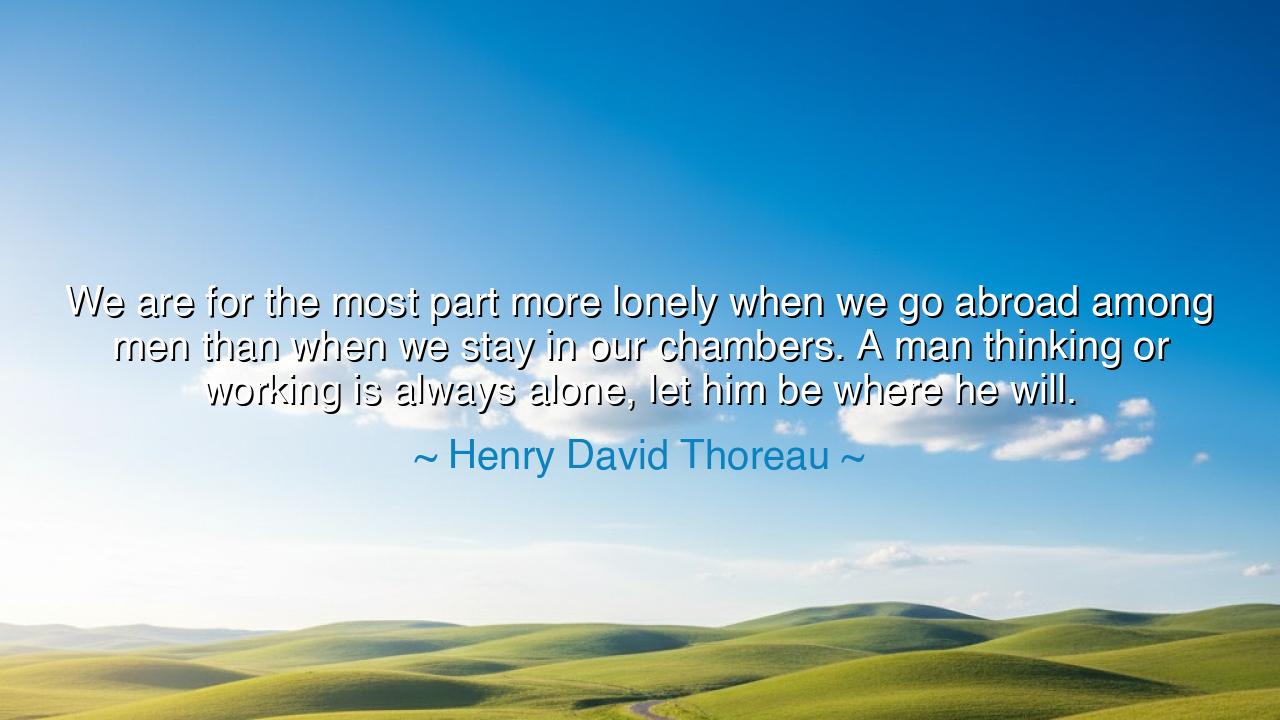
We are for the most part more lonely when we go abroad among men
We are for the most part more lonely when we go abroad among men than when we stay in our chambers. A man thinking or working is always alone, let him be where he will.






Henry David Thoreau speaks to a deep and often unspoken truth about human existence when he declares, "We are for the most part more lonely when we go abroad among men than when we stay in our chambers. A man thinking or working is always alone, let him be where he will." In these words, Thoreau captures the essence of solitude not as a physical state, but as a mental and emotional condition. He suggests that loneliness does not come merely from being physically alone, but from being misunderstood, distracted, or detached from one's inner world. Even in the company of others, the person who is deeply contemplative or focused can feel more isolated than when alone, for it is in thought and work that the soul truly engages with the world.
In the wisdom of the ancient philosophers, this idea resonates with the teachings of the Stoics. Epictetus often spoke of how external circumstances, including the company of others, cannot define a person’s inner peace. True contentment comes from within, from the self-mastery that allows one to engage with the world without being swayed by the opinions or actions of others. The Stoics believed that even when surrounded by people, one could feel the burden of loneliness if their thoughts were focused elsewhere, on higher ideals or on the cultivation of virtue. The mind and spirit are not confined to physical proximity—they exist independently, and it is this inner solitude that shapes our experience of loneliness.
Consider the life of Socrates, who, despite being surrounded by his followers and peers, was often alone in his thoughts. Socrates’ search for truth and his unwavering commitment to questioning the world around him led him to stand apart from the crowd. Though he had many companions, he was often criticized for his intense isolation from the opinions of others. His commitment to philosophical inquiry created a kind of loneliness, for his thoughts often led him to conclusions that were at odds with conventional thinking. Socrates, much like Thoreau, chose a life of deep reflection, where the soul’s quest for truth overshadowed the fleeting company of the masses.
Similarly, the great writer and thinker Ralph Waldo Emerson, a contemporary of Thoreau, echoed these sentiments in his work on self-reliance. Emerson believed that true individualism and freedom came not from the external validation of others, but from the strength to stand alone in one’s own truth. Emerson, like Thoreau, understood that the loneliness of a deep thinker is often not about physical isolation, but about the separation of mind and spirit from the masses. In his own life, Emerson often retreated to solitude, finding that only in moments of quiet reflection could he fully engage with the divine and the truth that shaped his life.
Yet, Thoreau’s words also reflect a deeper truth about the limitations of the human condition. When we engage with others, we often wear masks—whether out of social obligation or to conform to societal expectations. These masks create distance, preventing us from experiencing true connection. As Thoreau suggests, even in the midst of activity or social gatherings, the person who is deeply engaged in thought or work will feel alone, for their attention is drawn inward, away from the distractions of the external world. It is only in solitude that one can truly come face-to-face with their authentic self, free from the need for external validation or the approval of others.
The lesson here, dear reader, is profound: loneliness is not always defined by physical isolation. It is the disconnection between the inner self and the outer world that creates the most profound sense of solitude. As Thoreau implies, to be alone does not necessarily mean to be lonely. In fact, it is in the quiet solitude of our own company that we often find our most honest and deepest self. The loneliness we feel when surrounded by others is often a reflection of the inner disconnect between our true desires and the expectations of society.
Therefore, I urge you, as Thoreau did, to seek out moments of solitude, not as a retreat from the world, but as a space for self-reflection and growth. Understand that the loneliness you might feel in a crowd is not a reflection of your worth, but of the disconnection between your inner world and the external noise. It is in those times when you are truly alone with your thoughts that you can reconnect with your purpose, your truth, and your highest aspirations. Just as Socrates, Emerson, and Thoreau found meaning in solitude, so too can we find our deepest strength in moments of inner peace. Embrace the quiet and allow it to nourish your spirit, for it is in solitude that you will find the strength to engage with the world in a way that is authentic and whole.






AAdministratorAdministrator
Welcome, honored guests. Please leave a comment, we will respond soon